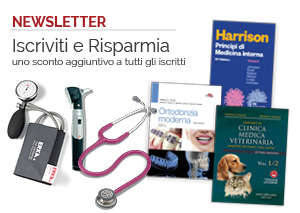Hospital based bioethics - A European Perspective
di Pegoraro - Putoto - Wray • 2007 • dettagli prodotto
per la spedizione in 5-7 giorni lavorativi
Potrebbe arrivare dopo Natale
da
a
€ 20,90

DESCRIZIONE
Advances in science and technology have led to profound changes in health care, yet despite the many benefits these advances bring there are increasing concerns about the way such technologies are applied. This in turn has stimulated a flourishing of academic interest in ‘bioethics’, but the degree of interest in and engagement with bioethics at the clinical level is less clear. Hospitals bring together a variety of professional and non-professional groups in the place where clinical dilemmas are daily events, and would seem ideal places to conduct an ongoing bioethics dialogue. A European Commission funded project set out to discover just how extensive bioethics education in hospitals throughout Europe is, and what could be done to promote it. This book is one of the outcomes of that project, described below.Preface VIntroduction XVIIChapter 1Bioethics, professional codes and law 1Eugenijus GefenasLearning objectives 1Key concepts 1Case studies 2Introduction: different normative approaches to medicine 3Professional codes, medical deontology and bioethics 4Traditional deontology 4Secularisation and the tendency to defend the integrity of the professionalgroup 5Internationalisation, value shift and specialisation 6The functions and limitations of medical deontology 7The transformation of medical deontology 8Bioethics and health law 8The impact of the human rights movement 9European international legal instruments in the field of biomedicine 10Ethics and law: important differences 11Illegal but moral/legal but immoral 12When should legislation stop? 13Finding a balance between law and ethics 14Conclusion 15Discussion questions 15REFERENCES AND FURTHER READING 16WEB BASED REFERENCES 16WEBSITES OF SOME INTERNATIONAL AND NATIONAL BIOETHICS BODIES 17Chapter 2Concepts and principles in hospital bioethics 19Marc GuerrierLearning objectives 19Key concepts 19Case studies 20Introduction 21Alternative ethical approaches 22The relationship between ethical principles and written regulations 23Primum non nocere 24Confidentiality 25Autonomy, beneficence, non-maleficence and justice 25Autonomy, dignity, integrity, vulnerability 27Example of application: The Convention of Oviedo 31Applying principles at the bedside 32Conclusion 34Discussion questions 34REFERENCES AND FURTHER READING 34Chapter 3Resource allocation in health care 37Giovanni Putoto, Renzo Pegoraro, Andrea SempliciniLearning objectives 37Key concepts 37Case studies 38Introduction 38From implicit to explicit rationing 39The levels of rationing: macro, meso and micro 40The decision makers and problems in reaching consensus: who decides? 41Methods of rationing 42Technical and distributive approaches to rationing 43Technical criteria 43Distributive criteria 46Theories of justice in health care 47The conflicts and limits of philosophical approaches 49The importance of the ethico-procedural approach 50International experiences 51Conclusion 54Discussion questions 55REFERENCES AND FURTHER READING 55Chapter 4The relationship between health professionals and patients 57Franz Josef IllhardtLearning objectives 57Key concepts 57Case studies 58Introduction 58What is meant by the term ‘relationship’? 60Traditional models of relationships 61Current conceptions 63Ethical justification concerning relationship-structures 68Can we learn relations in partnership? 70Case study 70Conclusion 75Discussion questions 75REFERENCES AND FURTHER READING 75Chapter 5Clinical ethics at the beginning of life 77Søren HolmLearning objectives 77Key concepts 77Case studies 78Introduction 79Proxy decision making for young children 80The decision maker 80The basis for decision making 82Pregnancy and childbirth 85Withholding and withdrawing treatment in neonatology 88Abortion and prenatal diagnosis 90Discussion questions 92REFERENCES AND FURTHER READING 92Chapter 6Clinical ethics at the end of life 95Tomasz Brzostek and Zbigniew ZalewskiLearning objectives 95Key concepts 95Case studies 96Introduction 97Care of the dying in the age of modern technology 98The meaning of “end of life” and “terminal illness” 99Treatment and care – what can be done for patients at end of life? 99Types of patients who are potentially affected by end of life decisions 101Problems in decision making – who is entitled to decide? 101Euthanasia 105Ethical values/principles 108Ethical argumentation 110Conclusion 112Discussion questions 113REFERENCES AND FURTHER READING 113Chapter 7The clinical ethics of psychiatry 115Søren HolmLearning objectives 115Key concepts 115Case studies 116Introduction 116Are mental illnesses real illnesses? 117Competence, incompetence and compulsory treatment 117Is incompetence irrationality? 119Danger to others 124Advance directives and treatment contracts 124Informal compulsion 125The role of the family in psychiatric ethics 126Some controversies concerning psychiatric patients 127Discussion questions 129REFERENCES AND FURTHER READING 129Chapter 8Hospital committees and bioethics consultation in hospital 131Norbert SteinkampLearning objectives 131Key concepts 131Case studies 132Introduction 133The health care ethics committee: its purpose, goals and tasks 134Written advice and ethical guidelines 138Education 139Moral problems in patient care: ethical case deliberation and ethicsconsultation 140Implementation 148Conclusion 149Discussion questions 149REFERENCES AND FURTHER READING 149Chapter 9Biomedical research ethics 153Josef GlasaLearning objectives 153Key concepts 153Case studies 154Introduction: the necessity and importance of biomedical research 155Research in medicine and biology – basic methodological issues 156Randomised clinical trials 157Biomedical research in health care settings 159Ethical principles of research on human subjects 160Risk/benefit evaluation 162Selection of research subjects 163Informed consent 163Persons unable to give informed consent 167Good Clinical Practice 168Research Ethics Committees 170Psychological research 173Conclusion 174Discussion questions 174REFERENCES AND FURTHER READING 175
DETTAGLI PRODOTTO torna su
ISBN: 9788829918416
Titolo: Hospital based bioethics - A European Perspective
Autori: Pegoraro - Putoto - Wray
Editore: Piccin
Volume: Unico
Edizione: 2007
Lingua: Italiano
Finitura: Copertina flessibile
Misure: 17x24 cm
Pagine: 178
RECENSIONI
NESSUNA RECENSIONE PER QUESTO PRODOTTO































